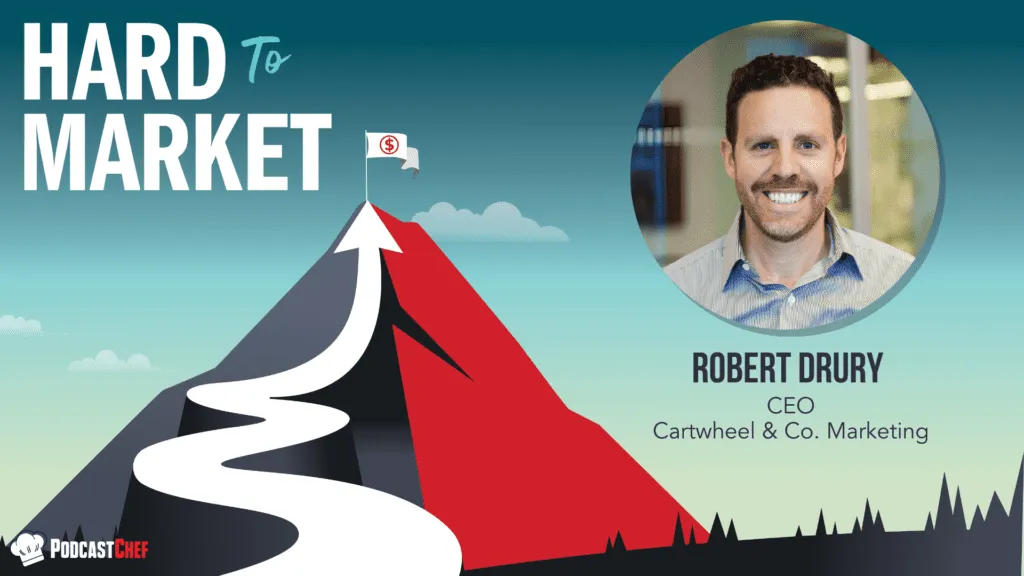In this episode, Robert Drury, CEO of Cartwheel & Co. Marketing an experiential marketing veteran, discusses the importance and impact of experiential marketing in the entertainment industry. He highlights how experiential events create meaningful connections with brands and the role of social media in amplifying these experiences. Rob also talks about the challenges and opportunities of starting an experience-based marketing business during a global pandemic, navigating industry changes like the end of the writer strike, and provides advice for junior marketers looking to get involved in experiential marketing. Overall, the episode provides valuable insights into the power of experiential marketing and how it can be utilized effectively in various industries.
Here are a few of the topics we’ll discuss on this episode of Hard to Market Podcast.
- Experiences provide a more immersive and personal connection compared to traditional advertising methods.
- Events are an investment that requires amplification through social media and earned media to reach a wider audience.
- Experience-based marketing is effective in sparking word of mouth and generating trust among consumers.
- The pandemic has highlighted the importance of social interaction and created a hunger for real-life experiences.
- While AI may impact the advertising industry more than the events space, it is important to stay prepared for potential changes.
Resources:
Connect with Robert Drury:
Connect with our host, Brian Mattocks:
Quotables:
- 25:21 – I think persistence. I mean, this is part, as a business owner and part as an experiential marketer, just starting where the industry was really small and trying different things out, you know, that old, you know, try, try again. That idea of fail forward I think is a pretty important one in life. Maybe it’s not specific to experiences in general. I think the second is kind of like, like I said earlier, like, do your homework. You know, there’s so much information available out there now because this has been around for so long that you definitely don’t need to try by doing. You can learn from those who’ve come before.
- 12:18 – The idea is to create something really really meaningful, which ultimately is gonna spark word of mouth, and you know, all of the tools in the marketing toolbox and everybody who went to school for it, you know, at the end of the day, nothing’s as powerful, I don’t think, anyway, as your friend saying, Hey, you gotta check this thing out, and maybe your second friend says it, by the time your third friend says it, you’re like, all right man, I gotta do it. You know, I trust these people.
- 14:08 – That experiences weren’t going anywhere. In fact, if anything, the pandemic had proven that isolation was not a healthy thing, you know? And very quickly in my world, people pivoted to these virtual events, which were, you know, some of ’em more successful than others. But none of them really, I don’t think captured the essence of a live event. And frankly, you know, a year and a half later we don’t see a lot of our virtual events anymore. I think they were a substitute for the real thing. So, you know, seeing all those happen, seeing that marketing budgets weren’t disappearing, they were just pivoting, and then that there was this hunger within the industry to do more.
- 17:33 – It’s all about how do you monetize this? And advertising is gonna have to be a big part of that in a way that it traditionally has in the TV space, just not in the last 10 years. So, you know, even in the last few months we’re doing business in the upfront new front space, which if your listeners aren’t familiar, those are big events in New York City where networks will get together with a bunch of advertisers and media buyers and tell them about their upcoming content. They’ll put on a show at like a radio city music hall, a theater show explaining it. And then there’s a big after-party.
- 18:17 -I think it’s kind of been a testament to the fact that so far anyway, there’s an opportunity to create experiences in that within the larger marketing mix. This, this genre of marketing, this tactic of marketing is kind of taken enough of a foothold that even if some things change, you know, the interest doesn’t change, the budgets don’t necessarily change. So it’s a question of what are we doing and where are we doing it, as opposed to whether we should be doing it at all.
